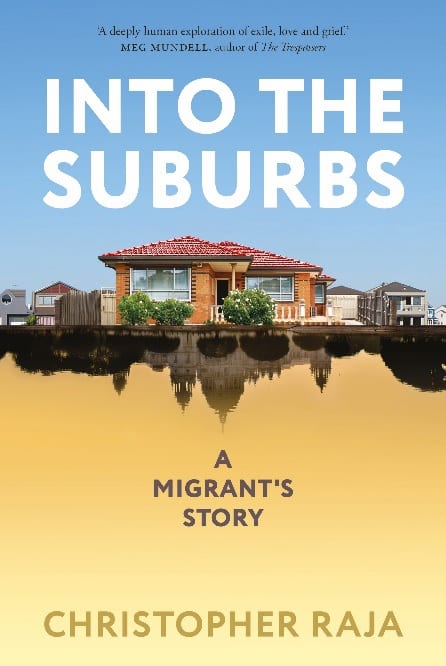
Christopher Raja’s Into the Suburbs, a biographical text detailing the author’s early life in India, upbringing and young adulthood in Melbourne, and ruminations on racism, culture, family and love, takes some time to hit its mark.
But when it eventually discovers a story to tell, it finds its stride – subsequently becoming difficult to put down.
The book recounts Raja’s life simply and chronologically. It starts with a conversation with his Aunty Thelma at the age of seven in Calcutta. From there, he writes about his move to the Melbourne suburb of Keysborough in 1986 at the age of 11 with mother Edith and father David. He details their respective occupational, academic, and emotional journeys throughout the late ‘80s and early ‘90s, including his late teenage years as an Arts student at the University of Melbourne. Describing the mixed-race relationships, hate-driven fights, and parental aspirations that affected his psyche as a young Indian in Australia, Raja covers much ground in the first 185 pages.
Such expansive covering, however, restricts extrapolating and communicating thoughtful messages from his initial life experiences.
Right from narrating his grandfather’s desire for approval from the British elite in Chapter 1 – which included changing the family name from ‘Rajaratnam’ to ‘Raja’ and converting to Christianity – to his mother’s difficulty with Australian colloquialisms (even after living in the country for decades) in Chapter 13, Raja overlooks some pertinent opportunities to reflect. Could he have used the eloquence and observational qualities he asserts his younger self had when describing these episodes?
Indeed, it seems he is engrossed in sharing a chronology, rather than elaborating on any impact it had on him. It leaves the impression that the text perhaps means more to its writer than its audience.
Fortunately, the latter end of the book overcomes this simplicity. It delivers the potential one hoped it would have, as it details Chris’ relationship with his late father David as an adult.
The struggle of a working-class father appearing to be emotionally detached from his son may be considered cliché, but Raja devotes the time and effort to reconstrue this in a more personal, and original, manner. Committing several chapters almost purely to this, the reader is allowed to understand and develop an emotional bond with David through Chris’ perspective. Every argument they have, shame they feel, and commitment to one another’s wellbeing subsequently becomes more meaningful to us.

Raja’s attempt to coalesce all the themes of his book at its end is more successful than we would have anticipated. The loss we feel when reading about David’s tragic ending makes us quickly forget our qualms with the book’s early chapters. As such, by winning the uphill battle for our attention, Raja must be commended.
Ultimately, though Into the Suburbs may not initially provide the ruminations on migrant life we expect due to its need to move from action to action, its end is a satisfying one nonetheless. As a short read, one should be willing to endure the book’s starting lows in order to thoroughly enjoy its late, great highs.
READ ALSO: Glass Walls: A Book Review



